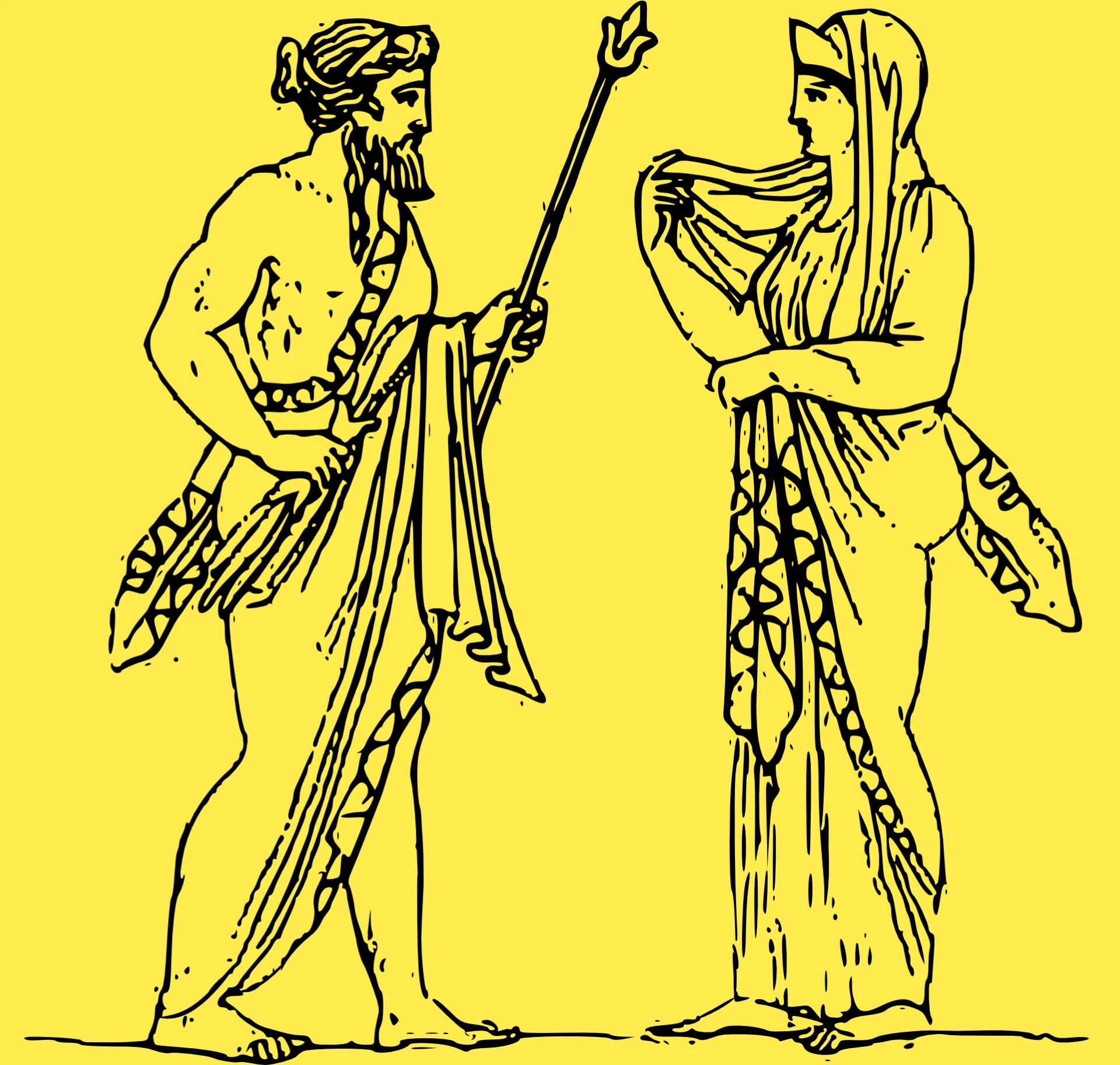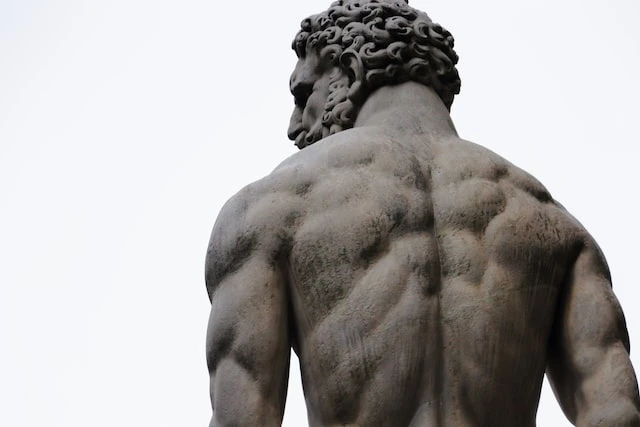When thinking about the heroes of Greek Mythology, you might think of a single, bearded man named Zeus. The origin stories of these famous figures are often less well-known but no less fascinating. We have compiled a list of some lesser-known origin stories from the world of ancient Greek mythology. From what we know about Greek God Zeus and the evidence of other myths, he was likely the son of either Kronos or Rhea.
In this article, we will discuss who was the Greek God Zeus as a character in ancient Greek mythology. Why is he so important to that story? We’ll also talk about some of his most famous novels. Some have come to us through various plays, movies, and books. Keep reading to find out!
Who was Zeus in Greek mythology?

Zeus, the central figure in Greek mythology, held great significance as one of the most prominent gods. Unraveling the essence of Zeus requires delving into a complex tapestry of narratives. Over time, his history evolved, presenting us with diverse accounts of his origins. These tales encompass his birth, his interactions with his parents, and relations with fellow deities. Amidst this richness, contradictions emerge, adding layers of enigma to Zeus’s persona.
According to certain versions, Zeus emerges as the offspring of Kronos, a formidable Titan, and Rhea, a revered goddess. In alternative renditions, Kronos himself is Zeus’s father. Zeus stages a successful coup against his paternal progenitor, ascending to the throne of the gods. In yet other variants, Rhea assumes the role of his mother, employing clever deception to safeguard her children. She artfully substitutes rocks for Zeus, enabling his escape from Kronos’s imprisonment through the latter’s regurgitation. Subsequently, following the Titans’ defeat in the grand war against the Olympians, Zeus claims the mantle of the divine king.
Renowned for his dominion over thunder and revered as the mighty God of Thunder, Zeus wielded immense power and commanded great awe.
Why is Zeus so important to Greek mythology?

Zeus, the formidable God of Thunder, holds a position of utmost significance in the realm of Greek mythology. His importance resonates through a multitude of captivating narratives. Many of which revolve around Zeus himself or his illustrious offspring. Notably, his son Heracles takes center stage in many renowned tales. Such as the epic saga of his 12 labors, which stand as exemplary representations of Greek mythology.
These stories serve as:
- Captivating windows into the interactions between gods and humans
- Shedding light on their treatment of one another
- Offering valuable insights into their perception in the ancient world.
Zeus’s intricate relationship with his wife Hera also plays a pivotal role in comprehending the nature of this god. Throughout the vast tapestry of Greek mythology, Hera consistently assumes the role of Zeus’s spouse. But their dynamic is far from straightforward. Love and animosity intertwine in their union, evident in stories where Hera emerges as the central character.
The profound impact of Zeus in Greek mythology cannot be overstated. As the God of Thunder, his dominion over natural forces and his role as a father figure to a lineage of influential offspring contribute to his lasting prominence.
Zues and his children: A brief overview

Zeus and Hera had many children, including Hebe, Ares, and Eileithyia. Zeus also fathered more children with other women. This is common in ancient myths. Various people likely wrote stories about Zeus. Over time, his relationships with multiple women and the children that resulted from them evolved.
Zeus’s relationships with other women show similarities and differences between him and Hera. His children often reflect this as well. Most of Zeus’s children are heroes. They are essential to the stories they appear in, and they are often the saviours of their people. Heroes are often flawed characters who must overcome complex challenges. Many of Zeus’s children are also flawed and must overcome their complex challenges.
Athena: Born fully grown from Zeus’s forehead, Athena was the goddess of wisdom, courage, and strategic warfare. She became one of the most revered deities in Greek mythology. She associated with various domains, including wisdom, crafts, and civilization.
Apollo: The god of music, poetry, prophecy, and healing, Apollo was Zeus’s son with the Titaness Leto. He was often depicted as a youthful and handsome deity, known for his musical prowess and divine oracles.
Artemis: The twin sister of Apollo, Artemis was the goddess of the hunt, wilderness, and childbirth. She was a skilled archer and protector of young girls, often depicted with a bow and arrows and accompanied by a group of nymphs.
Hermes: Zeus’s son with the nymph Maia, Hermes was the messenger of the gods, associated with travel, commerce, and communication. He was known for his speed and cunning, serving as the guide for souls to the underworld.
Persephone: Zeus’s daughter with Demeter, Persephone became the queen of the underworld after being abducted by Hades. She represented the cycle of seasons, spending part of the year in the underworld and the other part with her mother, bringing about the change of seasons.
The rise of Zeus: From Titan to King of the Gods
The rise of greek god Zeus from a Titan to the exalted position of the King is intertwined with two primary narratives. It unfold against the backdrop of the fall of the Titans, who once ruled the ancient world. These tales shed light on Zeus’s triumph over his father, the Titan, and his later ascent to power.
According to one account, after Zeus’s birth, his mother Rhea, apprehensive of her husband Kronos’s insatiable appetite for devouring his own offspring, clandestinely concealed the newborn on an island. To aid Zeus in his quest to overthrow his father, Rhea later bestowed upon him a mighty sickle. This weapon proved instrumental in Zeus’s successful coup against Kronos, securing his place as the dominant deity.
The second story, linked to the remove narrative, narrates how Zeus and his siblings joined forces to dethrone their grandfather. It exemplifies the cyclical nature of divine succession.
These intertwined accounts illuminate the extraordinary journey of Zeus, recounting his strategic cunning, resilience, and determination to claim the throne of the gods, thereby ushering in a new era that supplanted the reign of the Titans.
Zeus and Hera’s relationship

The relationship between Zeus and Hera, two prominent figures in Greek mythology, is a complex and multifaceted one. Hera, the queen of the gods and Zeus’s sister, became his wife and consort in most accounts.
Their union was characterized by a mixture of love, power struggles, and conflicts. Zeus, known for his many love affairs and infidelities, often faced Hera’s wrath and jealousy as a result.
Despite the discord, Zeus and Hera did have moments of genuine affection and partnership. They shared a powerful bond as husband and wife, and Zeus respected Hera’s role as the queen of the gods. In some myths, they worked together to achieve common goals or resolve conflicts within the divine realm.
Their relationship also symbolized the intricate balance of power and authority in the Greek pantheon. Zeus, as the king of the gods, held supreme rule, while Hera wielded significant influence as the queen and protector of marriage.
Overall, the relationship between Fod of thunder Zeus and Hera reflects the complexities and dynamics of both divine and mortal unions. It showcases a blend of love, conflict, power struggles, and occasional cooperation.
FAQs
Q: What is Zeus the god of in Greek mythology?
Zeus is the god of thunder and lightning in Greek mythology. He is also considered the king of the gods and ruler of Mount Olympus.
Q: How tall is Zeus depicted in the game God of War?
In the game God of War, Zeus is portrayed as a towering figure, but his exact height is not explicitly mentioned or measured.
Q: Why is Zeus considered the most powerful god in Greek mythology?
Zeus is considered the most powerful god in Greek mythology due to his immense authority as the king of the gods. He possesses control over thunder and lightning, which symbolizes his dominion over natural forces. Additionally, Zeus’s position as the ruler of Mount Olympus grants him supreme power and influence over both gods and mortals.

